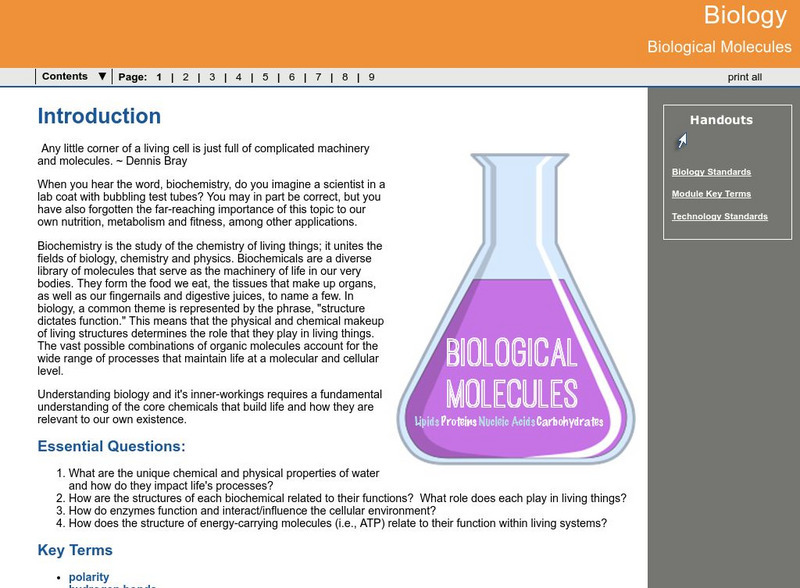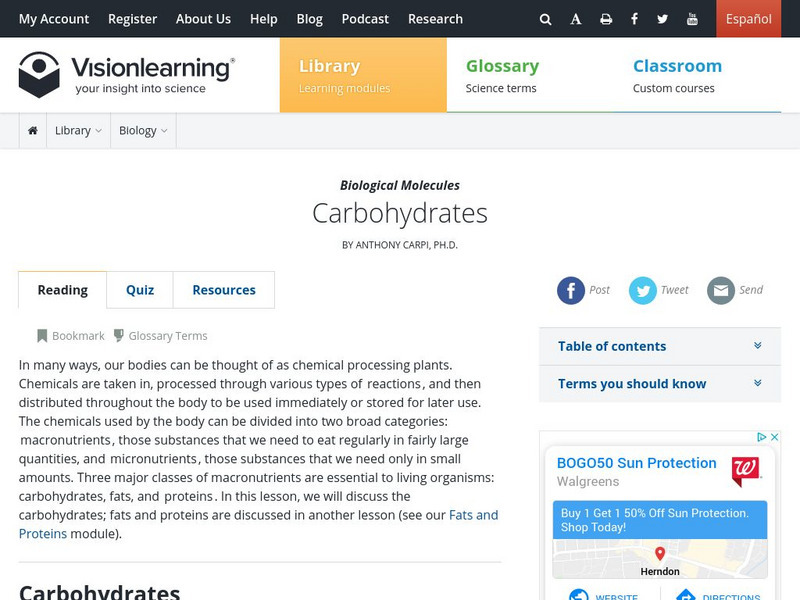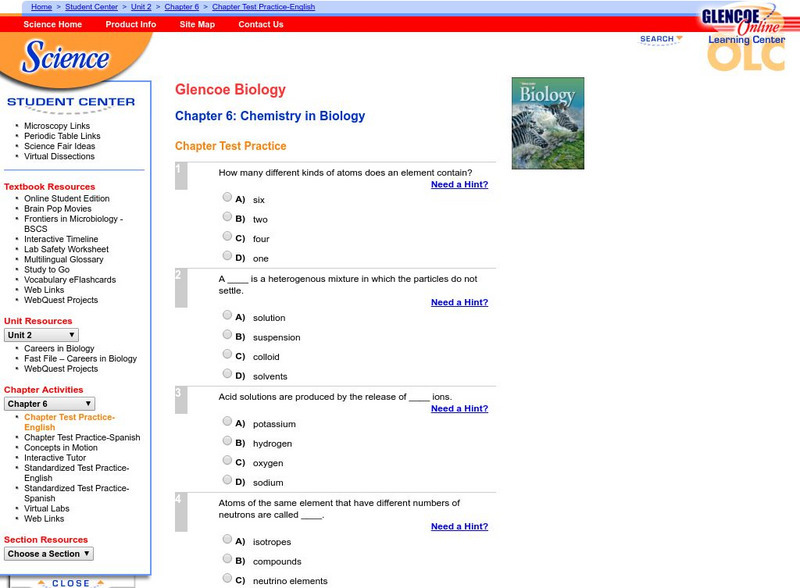Hi, what do you want to do?
Curated OER
Toxicology 2: Finding the Toxic Dose
Students brainstorm with group partners to decide upon a chemical they would like to test, and outline a procedure for their investigation. They then present in groups their ideas to the rest of the class as well as the chemical they...
Curated OER
Comparison of Four-, Six-, And Eight-bp Cuts in Calf Thymus Dna
High schoolers investigate the use of restriction enzymes to recognize a four-, six-, and eight-nucleotide sequence. They utilize restrictive endonucleases to cut Thymus DNA and compare results by viewing the DNA fragments on Agarose Gel...
Curated OER
The Cloning of Plasmid and Spinach DNA
Students will first extract genomic DNA from spinach and perform a restriction enzyme digestion on both the spinach DNA and the plasmid using the same restriction enzyme. They then ligate the cut plasmid DNA with the cut spinach DNA in...
Curated OER
The Cell Cycle and Cancer
High schoolers compare and contrast the cell cycle of frog eggs, normal cells, and cancer cells. They watch a video about early development of the frog embryo, generate a hypothesis in small groups, and listen to a teacher-led lecture. ...
Curated OER
Nutrient Biochemistry
In this lipids worksheet, students review the different types of lipids and how lipids are used by the body. This worksheet has 3 drawings and 27 fill in the blank statements.
Curated OER
The Living Environment
Ninth graders study the work of Alice Huang and complete activities on mutations. In this investigative lesson plan students complete several activities and discuss their findings at the end.
Curated OER
Heat Transfer and Pollution
Students perform computer simulations on air dispersion. In this chemistry lesson plan, students calculate energy transfer based on specific heat and temperature change. They explain the causes of smog.
Georgia Department of Education
Ga Virtual Learning: Biology: Biological Molecules
Through informational text, interactive activities, step-through animations, and video clips, studnet explore biochemistry and the molecules that make up living things.
Vision Learning
Visionlearning: Biological Molecules: Carbohydrates
An explanation of why carbohydrates are important nutrients for the human body. Chemical formulas and structures are used to demonstrate simple and complex carbohydrates.
Vision Learning
Visionlearning: Biological Molecules: Fats and Proteins
An explanation of the importance of fats and proteins in the human diet. Examples of chemical structures of various fats and proteins are used.
Vision Learning
Visionlearning: Biological Molecules: Lipids
Lipids are defined. Chemical structures are used to demonstrate that fats and oils store energy.
CK-12 Foundation
Ck 12: Episd: First Organic Molecules
[Free Registration/Login may be required to access all resource tools.] Take a look at the groundbreaking organic molecules formed millions of years ago. Study the RNA that might have been that first organic molecule. In Earth's early...
CK-12 Foundation
Ck 12: Organic Molecules & the Miller Urey Experiment
[Free Registration/Login may be required to access all resource tools.] Examines how the first organic molecules were formed. The experiment of Stanley Miller and Harold Urey is explored along with the RNA world hypothesis.
BioMan Biology
Bio Man Biology: Life Chemistry Quizzes
Two multiple-choice quizzes, one on the processes and types of biological molecules, the other on the structure and replication of DNA.
Concord Consortium
Concord Consortium: Science of Atoms and Molecules: Nucleic Acids and Proteins
Through this activity, students work with macromolecules, proteins and nucleic acids. The focus is on the atomic structure of proteins, how linear polymers are made, and the surface charges of the resulting polymers. . Multiple-choice...
National Institutes of Health
Ncbi: The Molecular Biology of the Cell: The Chemical Components of a Cell
Advanced chapter of the book "The Molecular Biology of the Cell" describes and provides illustrations of our most current understanding of the chemical makeup of cells and their components. Explains in detail how electron activity keeps...
CK-12 Foundation
Ck 12: Biology: Organic Compounds Study Guide
Explore and review the biological molecules necessary for life.
Khan Academy
Khan Academy: Biological Macromolecules Review
A review of the structure and function of biological macromolecules.
Khan Academy
Khan Academy: Biology Foundations: Unit Test
A nine-question unit test over biology foundations along with a review of the chemistry basics to help you understand the beauty of life.
Khan Academy
Khan Academy: Biology: Chemistry of Life: Chemical Bonds
Review over covalent, hydrogen, and ionic bonding in this article. Learn how molecules are held together by chemical bonds.
Khan Academy
Khan Academy: Biology: Water, Acids, and Bases: Solvent Properties of Water
An article investigating why water makes a good solvent. Also, understand what molecules dissolve best in water.
McGraw Hill
Glencoe Biology: Chemistry in Biology: Chapter Test Practice
Try these twenty multiple-choice questions to review the concepts of the chemistry embedded in biology. Each question has a clickable hint, and the entire assessment is self-checking.
Concord Consortium
The Concord Consortium: What Are Proteins and How Do They Fold Into Biologically Important Shapes?
In this learning module from The Concord Consortium, students will investigate how polar and nonpolar regions in big molecules interact to result in certain shapes and properties for those molecules.
University of Arizona
University of Arizona: Using Computers to Study Molecular Structure
The main objective for this exercise is to enhance your study of the properties and structures of biological molecules with modern computer graphics. Rather than passively viewing illustrations of molecular structure as they occur in...
























